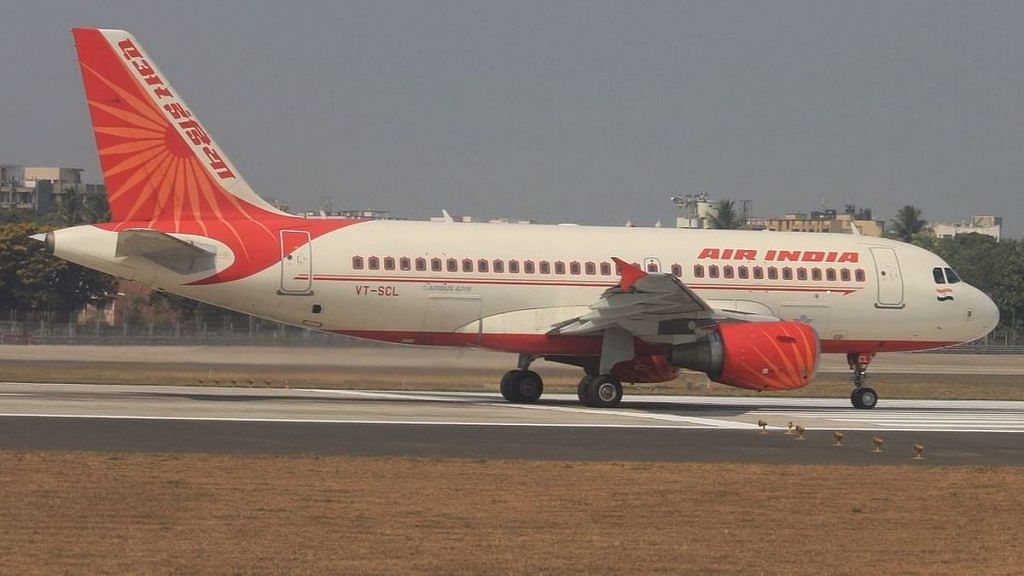New Delhi: The Rashtriya Swayamsewak Sangh (RSS) has conveyed to the Narendra Modi government that national carrier Air India should be sold only to an Indian entity, ThePrint has learnt.
The Sangh’s opposition to foreign airlines comes at a time when there are reports that carriers like Etihad Airways have evinced interest in picking up a stake in Air India.
Swadeshi lobbies like the Swadeshi Jagran Manch, the Bharatiya Mazdoor Sangh and sections within the ruling Bharatiya Janata Party (BJP) have opposed the sale of the government-owned airline arguing that it is against national interests.
BJP MP Subramanian Swamy has also been vocal in his opposition, and even threatened to go to court against the deal. He termed the deal anti-national and questioned why the government wants to sell the family silver.
Air India disinvestment process restarts today https://t.co/72eklh9C3g: THIS DEAL IS WHOLLY ANTI NATIONAL and IWILL FORCED TO GO TO COURT. WE CANNOT SELL OUR FAMILY SILVER
— Subramanian Swamy (@Swamy39) January 27, 2020
Two RSS functionaries, who did not want to be named, told ThePrint that the Sangh’s views about the need for the Air India to remain in Indian hands even after divestment had been conveyed “right to the top” in the government.
On 27 January, the Modi government kick-started the process of selling its entire 100 per cent stake after deciding that it cannot pump in more money into the loss making airline. The airline reported a loss of Rs 8,550 crore in 2018-19, as against a loss of Rs 5,348 crore in 2017-18.
At a press conference after the release of the initial information memorandum of the Air India sale, Civil Aviation Minister Hardeep Singh Puri defended the government’s decision to sell the airline. “Air India’s financial position is fragile. It is under a debt trap. A private buyer can bring in operational and financial efficiencies,” he said.
He also countered the opposition stating that the views expressed by some sections within the ruling establishment do not reflect the views of the Government of India.
This is the second attempt by the Modi government to sell the airline after a failed first try. In 2018, the government didn’t receive even one bid for Air India as investors were put off by many of the conditions of the proposed sale.
Also read: To boost disinvestment receipts, Modi govt is using wartime law to sell ‘enemy property’
Who are the prospective buyers?
Prior to the release of the information memorandum, the government had held eight roadshows with investors. In these roadshows, the representatives for Air India met as many as nine firms including the parent firm of British Airways, Indian conglomerate Tata Sons that has two aviation ventures, and two domestic airlines — Indigo and SpiceJet, Bloomberg reported.
In addition to these firms, UAE-based Etihad Airways has also evinced interest in Air India. Etihad had a 24 per cent stake in Jet Airways before the latter went bust.
Other names doing the rounds include that of the Hinduja group and Interups, a US based fund.
To be sure, foreign airlines like Etihad Airways and British Airways will need an Indian partner to buy Air India to meet the existing foreign direct investment regulations.
What the FDI rules say
According to the current FDI rules, while 100 per cent foreign investment is allowed in domestic airlines, foreign airlines can only pick up to 49 per cent stake in domestic airlines and that too through the government approval route and not the automatic route.
However, the rules governing FDI investments in Air India are stricter, with the FDI policy having a separate carve-out for Air India.
“Foreign investment in M/s Air India Ltd., including that of foreign airline(s), shall not exceed 49% either directly or indirectly. Substantial ownership and effective control of M/s Air India Ltd. shall continue to be vested in Indian Nationals,” says the Foreign Exchange Management (Non-debt Instruments) Rules, 2019.
In addition, the foreign airlines will have to ensure that the chairman and at least two-thirds of the directors of the domestic airline are citizens of India. After the foreign investor invests in the domestic airline, the chairman and at least two-thirds of the directors of the domestic airline should be citizens of India. Foreign nationals working in the airline will require security clearance and import of all technical equipment will require prior clearance from the civil aviation ministry.
Tuhin Kanta Pandey, Secretary, Department of Investment and Public Asset Management, said at the government press conference that the interested buyers will have to adhere to the extant FDI regulations, thereby ruling out any relaxation.
Government confident of being lucky second time around
The Modi government is hoping to complete the process of shortlisting the bidders by 31 March. This will be followed by financial bids after which the government will finalise the buyer.
The government is confident of the sale going through after it made some changes to the bid conditions as compared to 2018. This time around, the government is offering the entire 100 per cent stake in Air India for sale as against the 76 per cent offered last time.
In addition, it has provided certainty to the prospective buyers about the level of Air India’s debt that will have to be borne by them. The government proposes to keep only Rs 23,000 crore of the Rs 60,000 crore of Air India’s debts in the airline’s books with the remaining being transferred out.
Also read: These are the top 5 officials working behind the scenes on Modi govt’s budget
